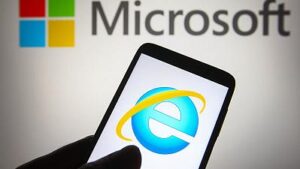
The consumer version of Internet Explorer is being phased out by Microsoft.
Microsoft will be disabling IE and directing Windows users to its modern Edge web browser in coming months.
Last year, it announced the plan, declaring Internet Explorer 11 to be the final version.
In 1995, Internet Explorer made its debut on Windows desktop computers, and by 2004, it had captured 95% of the market.
But now, Google Chrome, Apple’s Safari and Mozilla Firefox are dominant.
The popularity of Internet Explorer was harmed by the release of faster browsers such as Chrome and Firefox, as people flocked to new apps to traverse platforms such as Google Search, Facebook, and YouTube.
The rise of smartphones then arguably delivered the fatal blow, with Apple’s pre-installed Safari browser and Google Chrome on Android phones helping to shift internet access and usage into the mobile realm.
According to StatCounter, Google Chrome now accounts for more than 60% of global desktop internet traffic, with Internet Explorer and Edge’s combined share of the desktop market slightly trailing Firefox for the first time.
Bill Gates, a co-founder of Microsoft, said in 1995 that the release of Windows 95 – and with it, Internet Explorer – would be part of the company’s efforts to ride the “internet tidal wave.”
Read Also:https://ibrandtv.com/microsoft-process-store-eu-customers-data-solely-eu/
While his vision of “a microcomputer on every desk and in every home, running Microsoft software” may now seem a throwback to the dial-up era, Internet Explorer is sure to be recognized as one of the primary tools that molded the way the internet is used and accessed even today.

